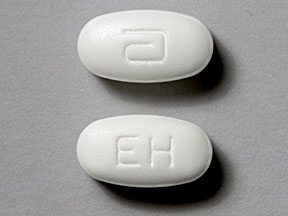Ery-Tab Dosage
Generic name: ERYTHROMYCIN 500mg
Dosage form: tablet, delayed release
Drug class: Macrolides
Medically reviewed by Drugs.com. Last updated on Jul 26, 2023.
In most patients, ERY-TAB ®(erythromycin delayed-release tablets) are well absorbed and may be dosed orally without regard to meals. However, optimal blood levels are obtained when ERY-TAB ®250 mg, ERY-TAB ®333 mg or ERY-TAB ®500 mg tablets are given in the fasting state (at least 1/2 hour and preferably 2 hours before meals).
Adults
The usual dose is 250 mg four times daily in equally spaced doses. The 333 mg tablet is recommended if dosage is desired every 8 hours. If twice-a-day dosage is desired, the recommended dose is 500 mg every 12 hours. Dosage may be increased up to 4 g per day according to the severity of the infection. However, twice-a-day dosing is not recommended when doses larger than 1 g daily are administered.
Children
Age, weight, and severity of the infection are important factors in determining the proper dosage. The usual dosage is 30 to 50 mg/kg/day, in equally divided doses. For more severe infections, this dose may be doubled but should not exceed 4 g per day.
In the treatment of streptococcal infections of the upper respiratory tract (e.g., tonsillitis or pharyngitis), the therapeutic dosage of erythromycin should be administered for at least ten days.
The American Heart Association suggests a dosage of 250 mg of erythromycin orally, twice a day in long-term prophylaxis of streptococcal upper respiratory tract infections for the prevention of recurring attacks of rheumatic fever in patients allergic to penicillin and sulfonamides. 1
Conjunctivitis of the Newborn Caused by Chlamydia trachomatis
Oral erythromycin suspension 50 mg/kg/day in 4 divided doses for at least 2 weeks. 3
Pneumonia of Infancy Caused by Chlamydia trachomatis
Although the optimal duration of therapy has not been established, the recommended therapy is oral erythromycin suspension 50 mg/kg/day in 4 divided doses for at least 3 weeks.
Urogenital Infections During Pregnancy Due to Chlamydia trachomatis
Although the optimal dose and duration of therapy have not been established, the suggested treatment is 500 mg of erythromycin by mouth four times a day or two erythromycin 333 mg tablets orally every 8 hours on an empty stomach for at least 7 days. For women who cannot tolerate this regimen, a decreased dose of one erythromycin 500 mg tablet orally every 12 hours, one 333 mg tablet orally every 8 hours or 250 mg by mouth four times a day should be used for at least 14 days. 3
For adults with uncomplicated urethral, endocervical, or rectal infections caused by Chlamydia trachomatis, when tetracycline is contraindicated or not tolerated
500 mg of erythromycin by mouth four times a day or two 333 mg tablets orally every 8 hours for at least 7 days. 3
For patients with nongonococcal urethritis caused by Ureaplasma urealyticum when tetracycline is contraindicated or not tolerated
500 mg of erythromycin by mouth four times a day or two 333 mg tablets orally every 8 hours for at least seven days. 3
Acute Pelvic Inflammatory Disease Caused by N. Gonorrhoeae
500 mg Erythrocin Lactobionate-I.V. (erythromycin lactobionate for injection, USP) every 6 hours for 3 days, followed by 500 mg of erythromycin base orally every 12 hours, or 333 mg of erythromycin base orally every 8 hours for 7 days.
Pertussis
Although optimal dosage and duration have not been established, doses of erythromycin utilized in reported clinical studies were 40 to 50 mg/kg/day, given in divided doses for 5 to 14 days.
Legionnaires' Disease
Although optimal dosage has not been established, doses utilized in reported clinical data were 1 to 4 g daily in divided doses.
Preoperative Prophylaxis for Elective Colorectal Surgery
Listed below is an example of a recommended bowel preparation regimen.
A proposed surgery time of 8:00 a.m. has been used.
Pre-op Day 2
Minimum residue or clear liquid diet. Magnesium sulfate, 30 mL, 50% solution (15 g) orally at 10:00 a.m., 2:00 p.m. and 6:00 p.m. Enema at 7:00 p.m. and 8:00 p.m.
Pre-op Day 1
Clear liquid diet. Supplemental (IV) fluids as needed. Magnesium sulfate, 30 mL, 50% solution (15 g) orally at 10:00 a.m. and 2:00 p.m. Neomycin sulfate (1.0 g) and erythromycin base (two 500 mg tablets, three 333 mg tablets or four 250 mg tablets) orally at 1:00 p.m., 2:00 p.m. and 11:00 p.m. No enema.
Frequently asked questions
- What causes black hairy tongue?
- What are enteric-coated tablets?
- Can you take antibiotics while pregnant?
More about Ery-Tab (erythromycin)
- Check interactions
- Compare alternatives
- Pricing & coupons
- Reviews (1)
- Drug images
- Side effects
- During pregnancy
- Drug class: macrolides
- Breastfeeding
- En español
Patient resources
Other brands
Erythrocin, Eryc, EryPed, Erythrocin Lactobionate, ... +3 more
Professional resources
Other brands
Erythrocin, EryPed, PCE Dispertab, E.E.S. Granules
Related treatment guides
Further information
Always consult your healthcare provider to ensure the information displayed on this page applies to your personal circumstances.


